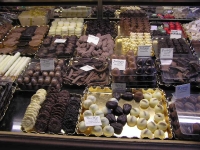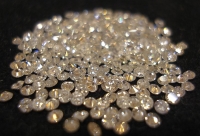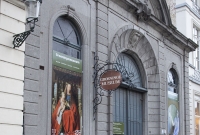Bruges Travel Guide
Bruges has the distinction of being Europe's best-preserved medieval city and Belgium's most popular tourist destination, a veritable 13th-century 'open air museum'. It's a small town with lots of character and charm, with postcard-perfect cobbled streets and a maze of waterways inviting exploration by foot, horse-drawn carriage or canal boat.
While it's easy to pass the time simply marvelling at the beautiful buildings, visitors to Bruges can learn more about the city's long history through the many fascinating museums dedicated to everything from chocolate and frites (chips or french fries) to diamonds, art and folklore and lace.
Bruges is a foodie's dream destination, especially for chocolate lovers. It's hard to go more than a few metres without stumbling on a window display of dainty confections, and there are several factories and even a museum dedicated to chocolate making in the city. The restaurants in Bruges are just as mouthwatering, ranging from Michelin-starred establishments to humble waffle houses.
Known for its notoriously less-than-idyllic weather, Bruges's summers are colder than most cities in Europe and its winters are chilly and wet. This doesn't stop the locals from enjoying themselves, though, as most of the city's biggest events take place in the winter, including chocolate and music festivals, ice sculpture competitions and Christmas markets.
Things to do in Bruges
There is no end to Bruges's charms, as visitors can have fun simply wandering the streets between attractions, enjoying the swans floating in the canals, and the restored medieval buildings lining the cobbled lanes. The winding streets are flanked by gorgeous facades and churches, and among them are a collection of museums housing some of the country's finest art, notably the Stadhuis and the Groeninge Museum.
A must-see for visitors to Europe, the entire historic centre has been recognised as a UNESCO World Heritage Site. Bruges is also known as the 'Venice of the North' and, as such, attracts many romantics to its intimate streets and canals; the graceful ambience of its ancient buildings provides the perfect backdrop for a special weekend away. For a spectacular view of Bruges over the red-tiled roofs, the more energetic can climb the 366 stairs of the central bell tower.

Choco-Story Museum
Chocolate lovers can't take a holiday to Bruges without stopping at the Choco-Story Museum, which details the history of chocolate dating back to the Aztecs and Mayans in 250 BC, and also demonstrates how the raw ingredients of cocoa are turned into the sweet treats everyone loves. Of course, each tour includes a tasting session and plenty of time in the gift shop. It's tempting to buy right then and there, but visitors should keep in mind that Bruges has more than 40 chocolate shops throughout the city. Guests are sure to leave the museum with a deep appreciation for where chocolate originally came from, and what the secret of great chocolate is.

Bruges Diamond Museum
Bruges has a long history of diamond polishing, going back to 1450 when local goldsmith Lodewijk van Berquem invented the modern technique of using diamond powder on a rotating disk. The Bruges Diamond Museum's (Diamantmuseum Brugge) variety of exhibits cover the history and techniques of diamond cutting and polishing, mining, setting diamonds and the evolution of the diamond trade over several centuries. Visitors can view live polishing demonstrations each day and the institution often hosts temporary exhibitions of famous stones and jewellery. The gift shop stocks rough and synthetic diamonds, as well as more reasonably priced souvenirs.

Groeninge Museum
Considered one of Bruges's best museums, the Groeninge Museum houses a large collection of fine art going back to the 15th century, including works by famous Flemish painters Jan van Eyck, Hieronymus Bosch, Rogier van der Weyden and Hans Memling. Though some of the works are from recent years, the museum's collection focuses exclusively on works with classical techniques and has some exquisite pieces for visitors to marvel at. Many of its paintings are looked on as milestones in the history of European art. For fans of classical art and those wishing to gain an insight into Belgian and European life in the past, this museum is certainly not to be missed.
Eating Out
While perhaps not on par with that of London or Paris, the restaurants in Bruges offer wonderful variety to suit all tastes and budgets. On one end, the scene has Michelin-starred establishments such as De Karmeliet and Den Gouden Harynck, and at the other there are humble shopfront vendors serving up delicious local specialities such as fricadellen and frites (chips or french fries dipped in mayonnaise). Other typical Belgian dishes include moules-frites (mussels and chips), waterzooi (a rich chicken and vegetable stew) and tomate-crevette (a hollowed-out tomato stuffed with prawns and mayonnaise).
Belgian beer is also considered among the best in the world, and local varieties are brewed in a range of styles to pair with certain dishes; waiters will be happy to recommend something.
One important thing to remember about dining in Bruges is always to leave room for dessert. Belgium is well known for its delectable chocolate, often considered the standard by which even Swiss chocolate is measured. Delicate seashell pralines cap off any meal spectacularly. Foodies who have a bit more stamina should be sure to try a light and crispy Belgian waffle, dusted with powdered sugar and served with whipped cream and strawberries.
Shopping
Though shopping in Bruges isn't quite the luxury sport as found in Brussels or Antwerp, visitors to the city will find plenty of eclectic boutiques, markets and shops to occupy them.
A number of upmarket shops and boutiques are scattered around the city on streets such as Noordzandstraat, Zuidzandstraat and Geldmuntstraat, and around the Markt. Bruges also has a few good markets, including daily markets on the Markt. The Antiques and Flea Market enjoys a picturesque location along the canal on the Dijver, and has a good selection for bargain-hunters.
While not known for fashion, Bruges has a long tradition of lace-making that goes back centuries. While much of it is now machine-made, there are beautiful examples of lacework available in traditional styles, including bloemenwerk, rozenkant and toversesteek.
By far the most popular souvenir from Bruges, though, is chocolate. With more than 40 chocolate shops around the city, visitors will be hard-pressed to leave Bruges without a box of pralines tucked into their luggage.
Getting Around
Getting around Bruges on foot is easy, as the city centre is compact and has many pedestrian streets. Another good way to get around in Bruges is by bicycle, as visitors can hire bicycles from the train station. For those who do hire a bicycle, it's a good idea to become familiar with the traffic regulations in Bruges to avoid fines.
If the weather is less than perfect, Bruges has public buses that operate regular service during the day, and day passes can be purchased. Multi-day passes are available as well, but visitors should keep in mind that tickets cost marginally more when purchased from the bus driver than from a De Lijn sales office or machine.
Driving in Bruges is not recommended, as the narrow streets and numerous pedestrian thoroughfares add to the frustration of very limited parking options.
Bruges Climate and Weather
Bruges enjoys a temperate maritime climate with more consistent temperatures than in other parts of Belgium. Rainfall is common throughout the year and the winter and spring months are the wettest. Summer weather in Bruges is mostly dry with mild to warm temperatures. Travellers should be aware of the possibility of rain, regardless of the season. Average summer highs hover around 26C (79F) and July and August are usually the hottest months in Bruges, making it the best time of year to visit. The average temperature during the winter months is 9C (48F) and heavy rainfall is not uncommon in January and February, with frequent fog.
Belgium travel info
Electricity
The electrical current in Belgium is 230 volts, 50Hz. Types C and E plugs are the official standards, though Type F plugs can also be used.
Language
The Flemish, in the north, speak Dutch; the Walloons in the south speak French. Brussels is bilingual, the majority of citizens speaking French. In the east, there is a small German-speaking community. English is also spoken.
Money
The Belgian currency is the euro (EUR). International credit cards are widely accepted and ATMs are available in all towns and cities. Banks are open Monday to Friday, 9am to 5:30pm, and are closed on Saturdays, Sundays and holidays. Some banks close for an hour during lunch.
Tipping
Service charges are included in bills and tips are only left for exceptional service.
Health
All eligible travellers should be up to date with their COVID-19 vaccines, and it's recommended that they're up to date with routine vaccines as well. Medical facilities and care in Belgium are excellent but expensive, so travellers are advised to take out medical insurance. UK citizens should have a Global Health Insurance Card (GHIC), which replaced the European Health Insurance Card (EHIC) for UK citizens. The GHIC allows UK citizens access to state healthcare during visits to the EU. The GHIC is not valid in Norway, Iceland, Liechtenstein or Switzerland, nor is it an alternative to travel insurance.
Safety
Most visits to Belgium are trouble-free, but travellers should be wary of street crimes such as mugging and pickpocketing in the cities, particularly in Brussels at major railway stations and on public transport. Brussels is home to a number of international organisations, including EU and NATO, which could become the target of indiscriminate terrorist attacks.
Local customs
Among young locals, especially Francophones, girls rarely shake hands but kiss other girls and boys. The number of kisses varies depending on the region of Belgium, foreigners often have a hard time determining which side to kiss first and how many kisses to give. It's best to follow the Belgian's lead. The law requires everyone to carry some form of official identification at all times; possession of drugs and trafficking in drugs are serious offences.
Doing business
Belgians are very formal in business and have a keen sense of style. dress should be conservative. Conservative yet stylish suits are recommended for men; women should opt for stylish business suits, or dresses and blouses.
Punctuality is extremely important at meetings, which will begin and end with a quick, light handshake. It is standard practice that all involved exchange business cards, and it is recommended that cards are printed in English, with the other side translated in either French or Dutch, depending on the main language of the region where business is to take place.
Visiting business people should research beforehand whether a business is French or Dutch-speaking. Compromise is very important in Belgian business culture and may be required as a show of friendship. Business hours are generally 9am to 5pm.
Duty free
Travellers to Belgium arriving from non-EU countries are allowed to enter the country with the following items without incurring customs duty: 200 cigarettes, 100 cigarillos, 50 cigars or 250g tobacco; 1 litre spirits over 22 percent in alcohol or 2 litres of dessert wine 22 percent in alcohol and sparkling wine, as well as 4 litres wine and 16 litres of beer; and other goods such as souvenirs to the value of €430. Prohibited items include unpreserved meat products.
Communications
The international access code for Belgium is +32. Hotels, cafes and restaurants offering free WiFi are widely available. As international roaming costs can be high, purchasing a local prepaid SIM card can be a cheaper option.
Passport & Visa
The borderless region known as the Schengen area includes the following countries: Austria, Belgium, Czech Republic, Denmark, Estonia, Finland, France, Germany, Greece, Hungary, Iceland, Italy, Latvia, Lithuania, Luxembourg, Malta, The Netherlands, Norway, Poland, Portugal, Slovakia, Slovenia, Spain and Sweden. All these countries issue a standard Schengen visa that has a multiple entry option that allows the holder to travel freely within the borders of all. Nationals of non-EU countries are recommended to hold return or onward tickets, sufficient funds and documents for their next destination. It is recommended that passports are valid for six months after departure from any holiday destination.
Entry requirements
US nationals must have a passport valid for three months beyond period of intended stay. A visa is not required for stays of up to 90 days.
British passports should be valid for the period of intended stay in Belgium. No visa is required for stays of up to 90 days in a half-year period.
Canadians must have a passport valid for three months beyond period of intended stay. A visa is not required for stays of up to 90 days.
Australian nationals must have a passport valid for at least three months beyond period of stay. A visa is not required for stays of up to 90 days.
South African nationals require a passport valid for at least three months beyond intended period of stay. A visa is required.
Irish nationals require a valid passport. No visa is required.
New Zealand nationals require a passport valid for at least three months beyond intended period of stay. No visa is required for stays of up to 90 days.
Useful contacts
Belgian Tourist and Information Office, Brussels: www.visitbelgium.com/
100 for medical or fire emergencies, 101 for the police, 112 is the pan-European emergency numberEmbassies / consulates in other countries
Embassy of Belgium, Washington DC, United States: +1 202 333 6900.
Embassy of Belgium, London, United Kingdom: +44 (0)20 7470 3700.
Embassy of Belgium, Ottawa, Canada: +1 613 236 7267.
Embassy of Belgium, Canberra, Australia: +61 (0)2 6273 2501.
Belgium Embassy, Pretoria, South Africa: +27 (0)12 440 3201.
Embassy of Belgium, Dublin, Ireland: +353 (0)1 631 5284.
Consulate of Belgium, Wellington, New Zealand: +64 (0)4 974 9080.
Embassies / consulates in Belgium
Embassy of the United States, Brussels: +32 (0)2 811 4000.
British Embassy, Brussels: +32 (0)2 287 6211.
Canadian Embassy, Brussels: +32 (0)2 741 0611.
Australian Embassy, Brussels: +32 (0)2 286 0500.
South African Embassy, Brussels: +32 (0)2 285 4400.
Embassy of Ireland, Brussels: +32 (0)2 282 3400.
New Zealand Embassy, Brussels: +32 (0)2 512 1040.



